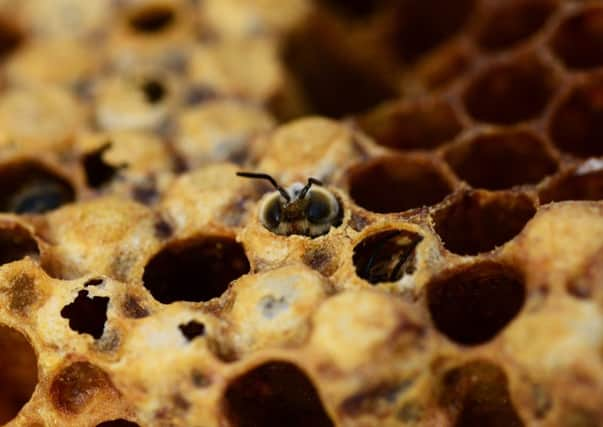Beekeeping: Survival battle is well worth the effort


Normally bees emerge from winter struggling to find enough food to survive but as soon as spring begins the huge bounty of pollen and nectar on the trees and flowers enables them to quickly gain strength and produce enough honey for humans to take a little.
What you collect then is fragrant and full of varieties and depths of flavours and as different from mass produced honey as a fine wine from cheap cooking plonk.
Advertisement
Hide AdAdvertisement
Hide AdUnfortunately ours produced none at that time of year. Winter was so warm and wet that they were weakened by damp and their recovery took time. When they did, it became necessary to split hives in two so they didn’t swarm all over the village and doing that also delayed the build up of honey.
By July, my bees were close to starving. Usually a gap in the supply of productive flowers in June gives insects some difficulty. This year a combination of too many rainy days when they couldn’t fly and a later gap meant that it was July when they really struggled to feed themselves and the larvae that were developing.
When I opened the hive in mid-July I found the bees had almost no food in store and one of the female worker bees was busy tugging a male drone bee out of the hive. Males are treated as unnecessary luxuries which can be thrown out of the family home and left to starve whenever times get hard.
Fortunately my wife didn’t take the same view when I arrived back empty handed so I was able to boil up some white sugar mixed with water and quickly got enough food into them to see them through.
Advertisement
Hide AdAdvertisement
Hide AdWithin a week things began to change and they were building up great quantities of stores. During August and September, the Himalayan Balsam invading the River Aire nearby provided lots of nectar. Each time we opened the hive more of this had been stored and before long there was enough to both see the bees through winter and reward us for looking after them.
A sophisticated professional extracts honey by providing a one-way escape route for the bees to separate them from the honey frames, then a centrifuge is used to spin off the honey before it is tapped into jars - we used a brush, a knife and a spoon but there was something deliciously enjoyable about this operation. The bees had evaporated most of the water from the nectar they’d collected, then pushed the concentrated honey into their hexagonal cells and covered it with beeswax. All we had to do was cut the top off the cells and spoon the golden liquid into a sieve so it could drip into a jug. We then poured the liquid into a few jars.
Most honey in the shops has been heated so as much as possible can be extracted and sold cheaply. Honey from local beekeepers will have almost certainly not been subjected to heat and contains a variety of trace elements, pollens and complex sugars. It’s likely to give your immune system a boost and often protects allergy sufferers by giving them a small desensitising dose of local pollen. Usually it has layers of taste that work their way through to your taste buds at different speeds so that if you eat good quality honey slowly the flavour at the start is very different to the flavour in the middle and at the end.
We put the spoon into our first jar of the new season’s honey and waited for that kind of experience. It was good, but it wasn’t as good as in some previous years. So much had come from one single plant that there wasn’t enough complexity for my liking.
Advertisement
Hide AdAdvertisement
Hide AdI consoled myself with two thoughts: firstly, it was still a lot nicer than anything I’d ever bought from a supermarket, and secondly, if I ever find myself on a Himalayan mountain I will probably not have to worry about suffering from asthma.